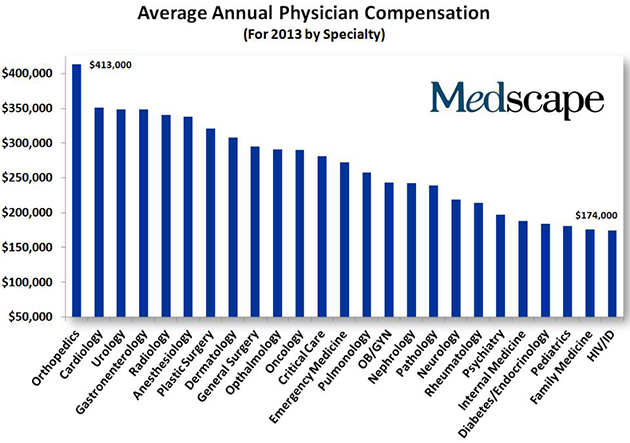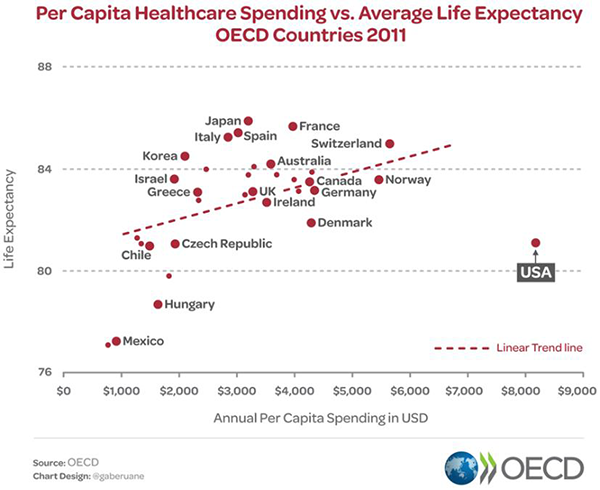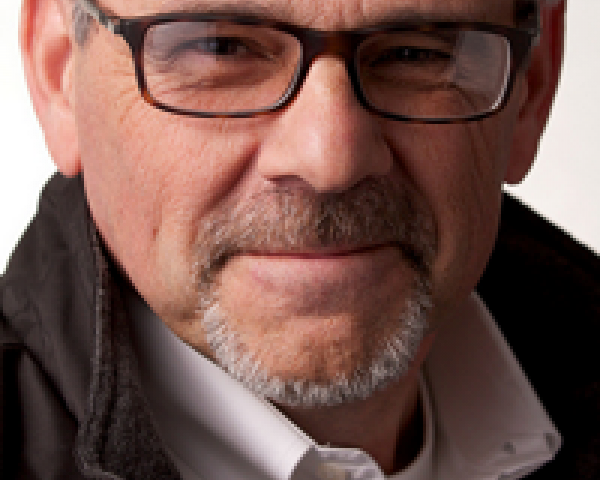. . . they have little choice. They come out of med school and residencies with so much debt that they almost have to enter lucrative specialties.
Funny: If you ask a doctor if she's overpaid, you'll get a long-winded answer largely around an emphatic "no."
The real answer is a much more nuanced "yes" -- and is summarized every year in this one chart:

The why of this chart isn't some big mystery. I've written about it very directly here:
Med Student Gives Sober Assessment of Future With $500K in Student Debt.
Healthcare training takes an incredible amount of time and money, so those who survive as freshly minted docs have a huge debt -- roughly equivalent to a nice home mortgage. Oh, and unlike all other types of financial debt, student debt is not dischargeable through bankruptcy, so it's lifelong until satisfied.
None of this is a mystery to U.S. med students. They are exceedingly bright (by necessity) and start planning their career trajectories fairly early. A key component to that planning is the amount of debt they'll have when they graduate -- and the number of remaining years they'll have as high wage earners. The math leads directly to the above graph.
If you have a choice at graduation of being a family practitioner or internist (with long, grueling hours, inside exam rooms all day) for $15,000 a month -- or the cushy job of being a radiologist (reading images remotely for eight hours a day) for $30,000 a month -- where's the choice? It's not a choice. It's a no-brainer (for most), which is why we have a severe shortage at all the specialties on the right side of the graph.
That's the U.S. (and why our system is dysfunctional from the start). The system we have is optimized around revenue and profits, not safety and quality.
France, by contrast, has a different view and (not surprisingly) better health outcomes and cost. France's view is that medical training is an "infrastructure" cost, and the best way to accommodate that is to have med students graduate with $0 debt. Now, in fairness, doctors in France don't have the opportunity at a lavish wage of $400,000 to $500,000 a year (or more), but the French also don't have a shortage of primary care docs. We do -- and it's also a contributing factor to why our system is now a global embarrassment and perpetual national crisis - as represented by this one chart:

 The why of this chart isn't some big mystery. I've written about it very directly here: Med Student Gives Sober Assessment of Future With $500K in Student Debt.
Healthcare training takes an incredible amount of time and money, so those who survive as freshly minted docs have a huge debt -- roughly equivalent to a nice home mortgage. Oh, and unlike all other types of financial debt, student debt is not dischargeable through bankruptcy, so it's lifelong until satisfied.
None of this is a mystery to U.S. med students. They are exceedingly bright (by necessity) and start planning their career trajectories fairly early. A key component to that planning is the amount of debt they'll have when they graduate -- and the number of remaining years they'll have as high wage earners. The math leads directly to the above graph.
If you have a choice at graduation of being a family practitioner or internist (with long, grueling hours, inside exam rooms all day) for $15,000 a month -- or the cushy job of being a radiologist (reading images remotely for eight hours a day) for $30,000 a month -- where's the choice? It's not a choice. It's a no-brainer (for most), which is why we have a severe shortage at all the specialties on the right side of the graph.
That's the U.S. (and why our system is dysfunctional from the start). The system we have is optimized around revenue and profits, not safety and quality.
France, by contrast, has a different view and (not surprisingly) better health outcomes and cost. France's view is that medical training is an "infrastructure" cost, and the best way to accommodate that is to have med students graduate with $0 debt. Now, in fairness, doctors in France don't have the opportunity at a lavish wage of $400,000 to $500,000 a year (or more), but the French also don't have a shortage of primary care docs. We do -- and it's also a contributing factor to why our system is now a global embarrassment and perpetual national crisis - as represented by this one chart:
The why of this chart isn't some big mystery. I've written about it very directly here: Med Student Gives Sober Assessment of Future With $500K in Student Debt.
Healthcare training takes an incredible amount of time and money, so those who survive as freshly minted docs have a huge debt -- roughly equivalent to a nice home mortgage. Oh, and unlike all other types of financial debt, student debt is not dischargeable through bankruptcy, so it's lifelong until satisfied.
None of this is a mystery to U.S. med students. They are exceedingly bright (by necessity) and start planning their career trajectories fairly early. A key component to that planning is the amount of debt they'll have when they graduate -- and the number of remaining years they'll have as high wage earners. The math leads directly to the above graph.
If you have a choice at graduation of being a family practitioner or internist (with long, grueling hours, inside exam rooms all day) for $15,000 a month -- or the cushy job of being a radiologist (reading images remotely for eight hours a day) for $30,000 a month -- where's the choice? It's not a choice. It's a no-brainer (for most), which is why we have a severe shortage at all the specialties on the right side of the graph.
That's the U.S. (and why our system is dysfunctional from the start). The system we have is optimized around revenue and profits, not safety and quality.
France, by contrast, has a different view and (not surprisingly) better health outcomes and cost. France's view is that medical training is an "infrastructure" cost, and the best way to accommodate that is to have med students graduate with $0 debt. Now, in fairness, doctors in France don't have the opportunity at a lavish wage of $400,000 to $500,000 a year (or more), but the French also don't have a shortage of primary care docs. We do -- and it's also a contributing factor to why our system is now a global embarrassment and perpetual national crisis - as represented by this one chart:







